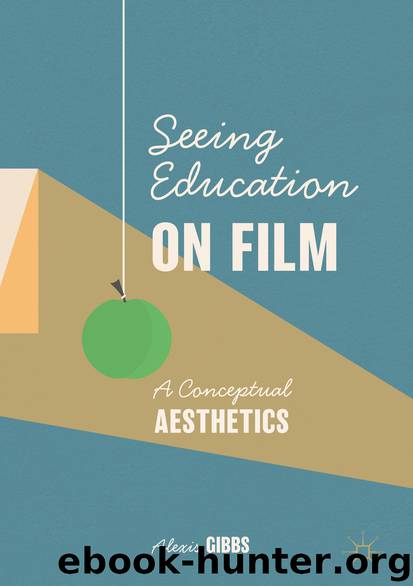Seeing Education on Film by Alexis Gibbs

Author:Alexis Gibbs
Language: eng
Format: epub
ISBN: 9783030336325
Publisher: Springer International Publishing
Conclusion: Teaching to Transgress Oneself
Traditional academic scholarship on the subject of teaching is often unable to account for the personal lives of teachers in its presentation because of the limits of the journal, the academic book, etc. These limitations are themselves boundaries of a genre that often prevent experience from emerging into evidence. What I hope to have achieved in this chapter is to have shown how my own experience of two films might make the case for film as conducting a conceptual investigation into what it means to be a teacher, and how one can become a teacher even when burdened with too self-conscious an understanding of teacherliness. Often this becoming is dependent upon transgressions, particularly in terms of a ‘private life’: in more conventional education dramas, there is little or no interaction between teacher and student in the teacher’s domestic environments, where they feel themselves to retain some kind of private experience. In dramas of re-education, the teacher’s domestic environment must be exposed as being continuous with his professional role, if the latter is not to enter into crisis. If Ben imagines that he has created more a classroom than a home in the wild, it is the presence of his children as students that disturb that distinction. So film can perform an interesting disruption of the separation of teacher from a broader social environment. It sees the teacher as someone who also moves between environments and institutions, and must negotiate the language games that provide the rules of behaviour in each.
In representing a disappointment in and with educational ideologies, film can provide the viewer with a re-education in the concepts of their everyday experience to rediscover language and objects and other people through the seeing of different aspects to them. In this instance, I have suggested that Half Nelson and Captain Fantastic offer us a re-education in the concept of the teacher, by asking again who the teacher is, how we recognise a teacher, what is the likeness of a teacher to a friend and to a parent (Drey will see Dan as many things over the course of the film, allowing her to settle on attitude that suits them both). The two films are therefore, on this view, concerned particularly with educational concepts, allowing us to suggest that they offer a re-education in education itself. This is where I think film fits best with the education I try to provide for my students, in that it presents concepts that are relevant to their field of interest, in a way that few other modes of pedagogical presentation are able to do.
In the next two chapters of the book, I want to pursue the idea of re-education further, but as further detached from its association with the genre. This is because I think it is a concept that will help us to see connections across genres, rather than identify films as belonging to a particular genre. In the first instance, I want to look at how the films
Download
This site does not store any files on its server. We only index and link to content provided by other sites. Please contact the content providers to delete copyright contents if any and email us, we'll remove relevant links or contents immediately.
Call Me by Your Name by André Aciman(20507)
Ready Player One by Cline Ernest(14656)
How to Be a Bawse: A Guide to Conquering Life by Lilly Singh(7481)
Wiseguy by Nicholas Pileggi(5777)
The Kite Runner by Khaled Hosseini(5171)
On Writing A Memoir of the Craft by Stephen King(4938)
Audition by Ryu Murakami(4926)
The Crown by Robert Lacey(4813)
Call me by your name by Andre Aciman(4680)
Gerald's Game by Stephen King(4644)
Harry Potter and the Cursed Child: The Journey by Harry Potter Theatrical Productions(4504)
Dialogue by Robert McKee(4393)
The Perils of Being Moderately Famous by Soha Ali Khan(4218)
Dynamic Alignment Through Imagery by Eric Franklin(4209)
Apollo 8 by Jeffrey Kluger(3707)
The Inner Game of Tennis by W. Timothy Gallwey(3682)
Seriously... I'm Kidding by Ellen DeGeneres(3631)
How to be Champion: My Autobiography by Sarah Millican(3592)
Darker by E L James(3514)
